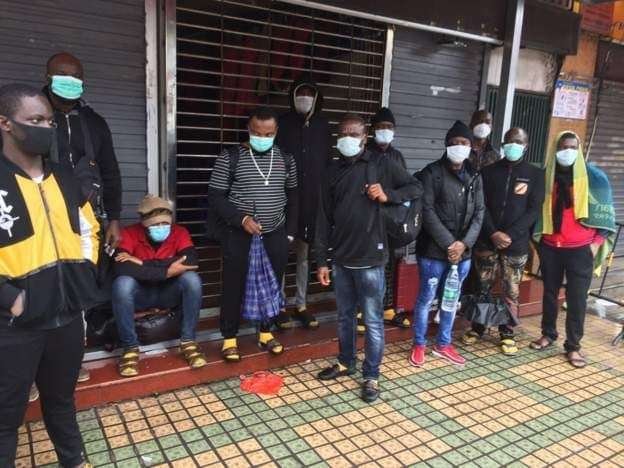298
In Guangzhou, China, African residents, and businessmen have been kicked out of hotels and apartments over fears of coronavirus. Over hundreds of those evicted say they were discriminated against and suspected of getting the virus carried out a testing campaign for the virus as health authorities.
The victims said they had paid rent to their landlords, but were pushed out of the apartments and
had to spend the night outside at the mercy of the weather, according to a BBC news report.
Some residents in that area said they had been evicted from their homes, while others had been put in forced quarantine without knowing whether or not they had the virus. A Congo businessman said he had been told to stay outside his house for 24 hours after the check without knowing the reason behind it. Guangzhou is home to one of the largest African populations in China and has become a center for buying and selling goods from African traders.
So far, only 16 confirmed cases of foreigners from African countries with COVID-19 have been reported in the Yuexiu District of Guangzhou. But what’s more frightening for the black community there than the virus itself is the growing tide of bigotry propelled by both coronavirus-fuelled xenophobia and deep-rooted racism against black people in China.
On April 6, Sanheli, a Yuexiu neighborhood known as “Little Africa” due to its large population of African migrants, became the subject of social media hysteria after a Weibo post that has since been deleted stating that the neighborhood village of Yaotai will be fully locked up for 14 days.
“In this span of time several different groups of people will be selected for research,” the post said.
Officials have denied there will be any such lockout. The post was written by a random Weibo user who did not mention the source of his knowledge but it ignited speculation that an outsiders-driven COVID-19 revival had occurred. As rumors rampantly flew, Weibo users started to imply that
Yaotai’s alleged lockout was to blame the local African community.
Many of them pointed out that the move came on the heels last week when a Nigerian man who had contracted COVID-19 reportedly assaulted a nurse while trying to escape a hospital in Guangzhou.
“The incident seems to have done more harm than all the locally transmitted cases that China has had to deal with over the past two months,” Weibo user wrote in a post that included a picture showing a blocked barricade street in Sanheli.
The query from the Weibo user has struck a chord with a large number of Weibo users.
The tweet had received about 23,000 comments and more than 547,000 likes as of Tuesday evening, one day after it was written.
Meanwhile, as similar concerns piled up, Weibo’s citizens started to coalesce around the hashtag (# GuangzhouSanyuanli) to spread racist, bigoted, and hateful propaganda about Guangzhou’s Africans.
In a typical Weibo message, a user wrote (in Chinese): “The Black people in Guangzhou are a serious city issue. We are unhygienic and lazy. Most of them are drug users or criminals, so their savings are not much. I wouldn’t be surprised if a second outbreak occurred in Guangzhou. “Meanwhile, the Guangzhou government information office said yesterday at a press conference that
after five Nigerian migrants tested positive for COVID-19 this week, the city had initiated a” comprehensive investigation “into possible coronavirus transmission within the expatriate group.
“To be frank, there is growing apprehension and anxiety in the region over a second wave of
cases,” Maximus Ogbonna, president of the Nigerian community in China, told Black Livity, a website based in China.
“So many associate this with immigrants, they’re checking to make sure they’re accurate.” But the local government has also been trying to quench the explosion of unfounded concerns regarding the city’s African population.
As of 7 April, over 32,000 people traveling from overseas had been brought under house quarantine or sent for 14-day isolation to specified facilities. Among these men, those carrying international passports made up about 6,300. The spokeswoman also tried to strike down reports of a Yaotai lockout, saying vehicles and people were free to enter and exit the village as long as they had clear health codes provided by local health authorities.
In denial of reports that there were about 300,000 African migrants in Yuexiu, the spokesman
said the district was home to about 3,500 foreigners, followed by Mali, Nigeria, Canada, and Australia.
A health official at the meeting noted that of the 111 imported cases reported in Guangzhou, 86 were Chinese people coming back from overseas when it came to imported coronavirus infections. For the rest, 16 were from African countries including Nigeria and Congo. But the official reasons were not enough for the many who had called for all African migrants to be deported in Guangzhou.
“This isn’t all about their coronavirus-era health risks. We have to leave the country forever!
“A Weibo user commented.
As of late, the expatriate community became increasingly targeted on the Chinese Internet, but Africans in Guangzhou still face casual racism. Last month, when China’s Justice Ministry released a new set of regulations intended to relax immigration restrictions for some foreigners, a groundwell of bigotry and ethnic stereotyping against Black people was met with fierce opposition. And, for no apparent reason, some hotels in Guangzhou were found in 2018 to drive away guests from African countries.


